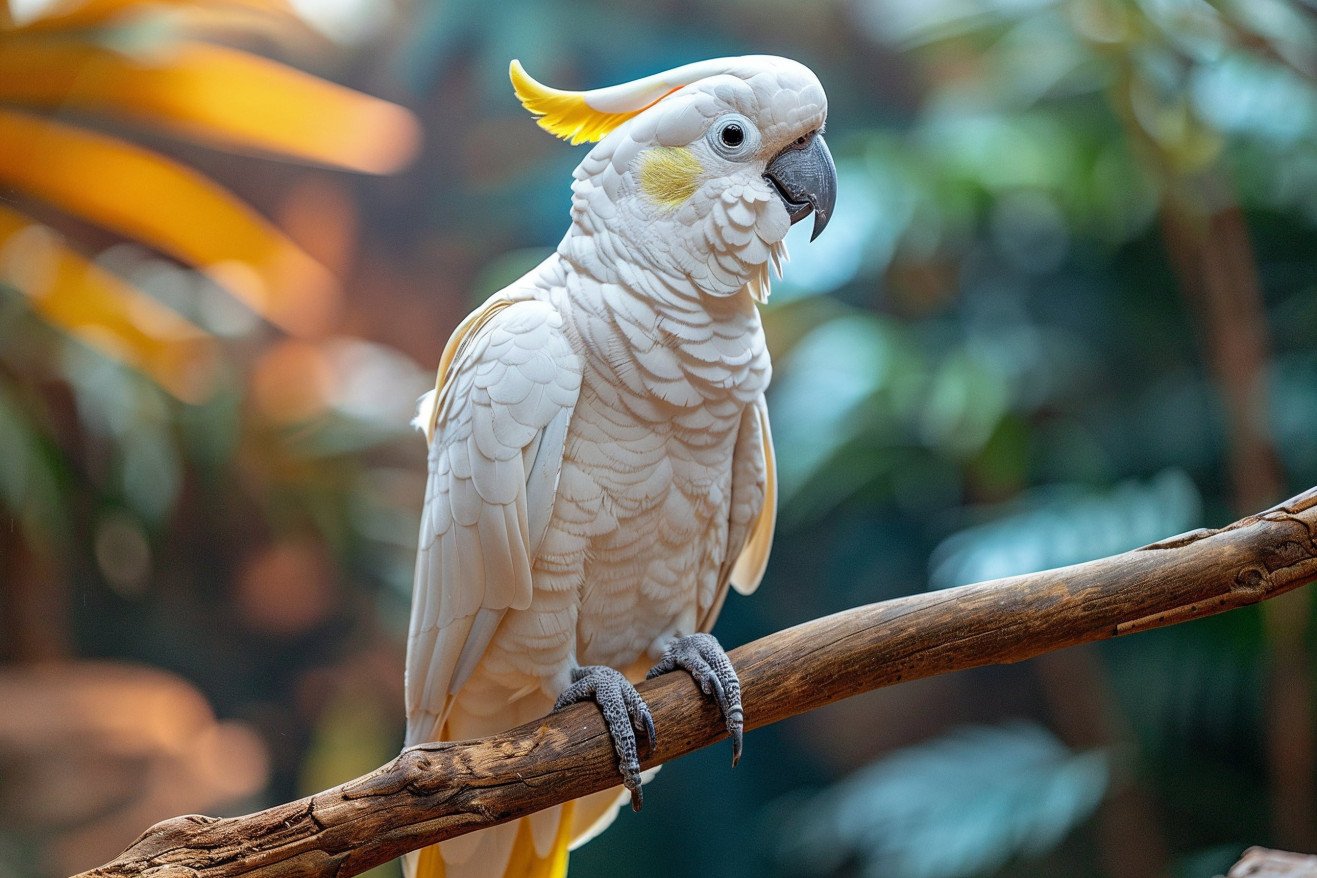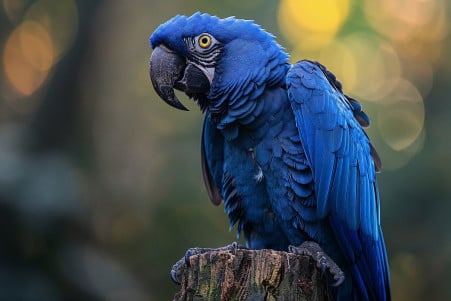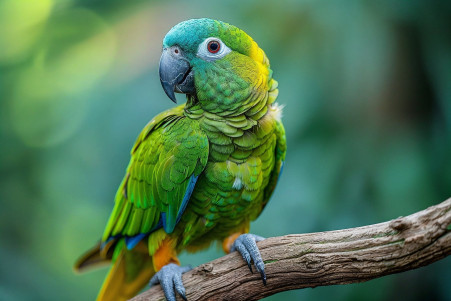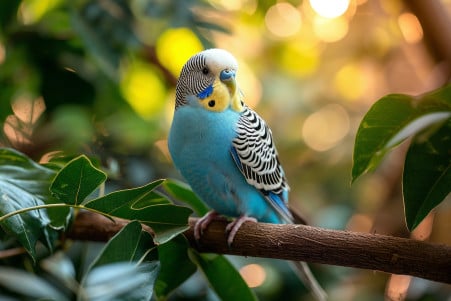How Long Do Cockatoos Live? Exploring Their Lifespan
15 March 2024 • Updated 14 March 2024

Given their lively and sometimes demanding nature, you might expect cockatoos to have a long life. And you’d be right. In the wild, many species of cockatoos can live between 20 and 60 years, which is an incredibly long time. In captivity, some of the larger species, like the Moluccan cockatoo, can live to be 70 years old and beyond with the right care.
To better understand the factors that affect the lifespan of cockatoos, we’re going to take a deep dive into the topic by looking at a range of reputable sources. By drawing on everything from zoological research and avian veterinary expertise to conservation biology, we hope to give you a comprehensive look at the things that determine how long cockatoos live.
In the process, we’ll also help you better understand the care, environmental, and genetic variables that can affect how long these amazing birds live.
How long do cockatoos live?
The Genetics of Cockatoo Longevity
Cockatoos are not only intelligent but also long-lived, making them a source of interest for both scientists and bird lovers.
A groundbreaking study by the Max Planck Institute has shown that there is a connection between brain size and lifespan in birds, especially parrots like the scarlet macaw and sulphur-crested cockatoo, which can live for 30 years or more. These birds have a large brain relative to their body size, a characteristic that may be important to their long life.
Meanwhile, the sequencing of the Blue-fronted Amazon genome, published by PMC, has shown that long-lived parrots have strongly selected for certain genomic traits, including those associated with telomerase activity and cognitive functions. These genetic traits not only help explain why these birds live so long but also have similarities to certain human traits, suggesting that the birds and humans have followed similar evolutionary paths.
These genetic findings have implications beyond scientific knowledge, providing important information for conservationists who are working to save these colorful birds. As we learn more about the genetic and evolutionary factors that influence the lifespan of cockatoos, we can see how a combination of genetics and the environment has shaped their lives.
Why Do Cockatoos Live So Long?
Cockatoos are known for their long lifespans, which can vary greatly depending on the species and whether they live in the wild or captivity. In the wild, cockatoos can live anywhere from 20 to 40 years, but in captivity, they can live to be 70 years old or more.
Moluccan cockatoos, which are the largest of the white cockatoos, can live up to 65 years. In fact, the oldest known cockatoo is a sulfur-crested cockatoo that lived to be 120 years old in captivity, although their average lifespan is around 65 years.
These lifespans are impacted by a number of factors, including what the birds are fed, the environment in which they live, and the care they receive.
A diet that includes a variety of fruits and vegetables and regular veterinary care are both important factors in the long lifespans of these birds.
In addition, the controlled environment of captivity offers a more stable and less risky environment than the wild, which accounts for the difference in lifespans between the two environments. It’s important for those who care for and work to conserve these birds to understand these factors so that they can ensure that these beloved birds live as long as possible.
Feeding Longevity: The Nutritional and Medical Plan for Cockatoos
A healthy diet is one of the most important factors in ensuring a cockatoo lives a long and healthy life, and it should include a mix of avian pellets, fresh vegetables, fruits, and grains.
However, Spruce Pets notes that seeds and nuts, which are a favorite of many cockatoos, should be given in limited quantities to avoid obesity and malnutrition. Meanwhile, Cockatoo Sanctuary strongly advises against feeding cockatoos poisonous foods like avocado, chocolate, and certain nuts, as these can lead to a range of health problems, including death.
Meanwhile, Exotic Animal Medicine for the Vet Tech explains that some of the most common health problems, including bumblefoot, feather plucking, and malnutrition, particularly a lack of vitamins A and E, are some of the most important things that can reduce a cockatoo’s lifespan. This makes regular veterinary care essential to catch and treat these issues early.
For cockatoo owners who want to make sure they’re doing everything they can to help their birds live as long as possible, the bottom line is clear: make sure your bird has a varied and safe diet, and watch for signs of health problems. After all, these intelligent birds’ well-being isn’t just about their physical health, but their mental health, which can also play a big role in how long they live.
Make sure your bird sees a vet regularly. After all, these intelligent birds’ well-being isn’t just about their physical health, but their mental health, which can also play a big role in how long they live.
Keeping Minds Sharp for Longer Lives: The Importance of Mental and Social Well-Being in Cockatoos
For cockatoos, mental sharpness and social interaction are necessary for their mental well-being and longevity, not just bonuses. The Daily Mail Online explains that a study found that if cockatoos don’t receive enough mental stimulation, they can exhibit self-destructive behaviors like feather plucking or pacing, which are signs of extreme mental distress. This can not only affect their life quality but also their life expectancy.
Similarly, Research published in Science, as referenced by the Max Planck Society, shows that social learning and interaction are important for cockatoos. In fact, in urban environments, sulfur-crested cockatoos have been seen teaching each other how to open trash cans, which shows just how important social interaction and mental stimulation are for these birds.
Cockatoo owners can help ensure their pets live long lives by providing social enrichment opportunities. Interactive toys, puzzles, and fun training exercises can give cockatoos the mental stimulation they would get in the wild. Avian Enrichment explains that these birds have the intelligence of a 3- to 4-year-old human child, so they need a stimulating and ever-changing environment to keep them happy and healthy.
The link between mental health and life expectancy is clear when it comes to cockatoos. To make sure these birds live full and long lives, it’s important to support their natural tendencies with plenty of social interaction and mental stimulation, which goes beyond just meeting their basic needs.
The Plight and Preservation of Cockatoos: Conservation Status and Efforts
The conservation status of cockatoos is different for each species, but many are in danger. For example, the white cockatoo, or umbrella cockatoo, is listed as Endangered due to habitat loss and the illegal pet trade, according to Wikipedia. Meanwhile, Baudin’s black cockatoo, one of the largest parrots in Australia, has a low reproductive rate and is threatened by illegal shooting, which has led to its status as endangered, according to WWF Australia.
Deforestation for agriculture and urban development and other human activities have a major impact on the birds’ habitats and life expectancies. The pet trade is still a major threat due to the capture of wild birds, and it has led to rapid population declines in species like the white cockatoo.
Legal protections, such as being listed on the CITES list, are an attempt to combat these threats by limiting the trade of wild-caught birds. Organizations like The Indonesian Parrot Project are working to support rehabilitation programs and sanctuaries that are vital to the rescue and conservation of these beautiful birds.
These efforts provide hope for a future where we can better understand and protect the natural life expectancies of cockatoos, ensuring that these charismatic birds will continue to be a part of our skies and our lives.
Unfurling the Wings of Time: A Cockatoo’s Life Span
Cockatoos are not only a marvel of nature but also a marvel of time. Their life spans, which can range from 20 to 60 years in the wild and up to 70 years or more in captivity, are evidence of their resilience and the complex interplay of genetics, care, and environment. Factors like brain size, genetic markers for telomerase activity, a well-rounded diet, and social enrichment all contribute to their longevity.
It is important to understand and nurture the long life of the cockatoo. Doing so is part of a larger goal of preserving the wonder and diversity of the world’s birds. Responsible care that is informed by research is important in ensuring the survival of these intelligent, social birds.
It is also important to continue to support their well-being through conservation, veterinary care, and enriched environments in both human care and the wild. The life span of the cockatoo is more than just a number, it is a measure of our care and the health of our world.


